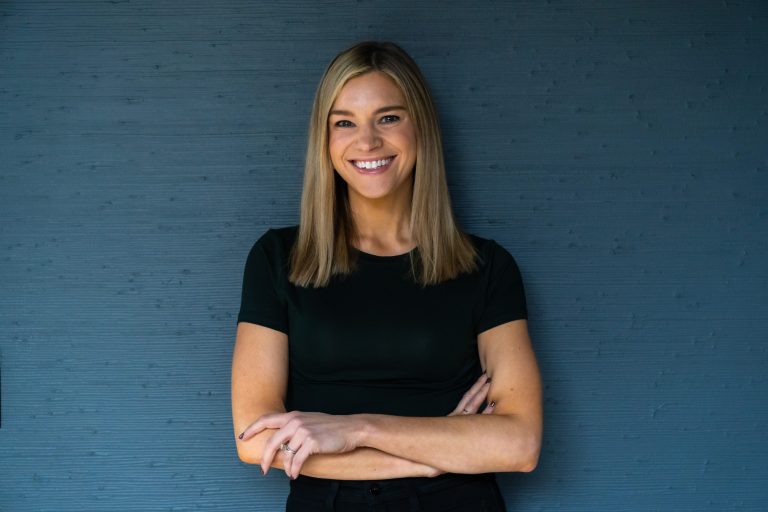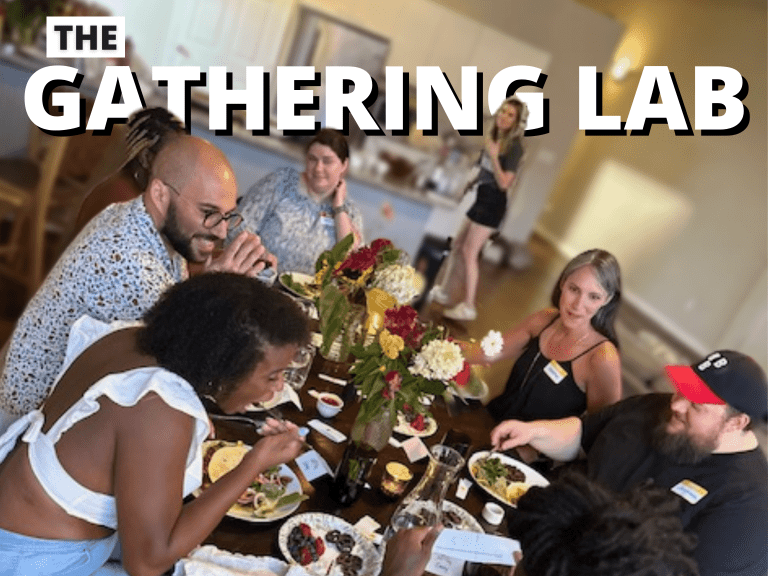Last updated: September 25, 2024
In today’s world, we’re all wired for online connections. It’s changing how we connect with each other. Physical social interactions are declining fast.
I met Janet when she reached out and sent me photos of her conducting The Gathering Lab dinner.
She’s read my book and hosted seven or eight of these small group dinners. They’re very special and intimate.
“Many times through my journey of hosting events I’ve grabbed your book and flipped it open to a random page. It was exactly what I needed to see and I’ve used so much of your book to help me think about these dinners, albeit with a totally new format.”
– Janet, The Gathering Lab
In this case study, you will learn:
- Why quality social connections are important
- The benefit of hosting a small group dinner
- How to host a dinner party
- What’s next for The Gathering Lab and how you can get involved
Why you should listen to me: My name is Nick Gray. I’ve hosted hundreds of networking events and cocktail parties for people all across the world. Doing this allowed me to become an expert at helping my guests mingle, while setting them up to use small talk. The New York Times, The Wall Street Journal, and New York Magazine have all written about me and my “culturally significant” parties.Meet Janet from Birmingham, Alabama

Janet is a creative, strategist and writer. She resides in Alabama, where she shares her home with her husband, daughter, two cats, and a cherished community of friends and family.
Driven by her quest for genuine, value-driven connections, Janet founded The Gathering Lab.
The Gathering Lab
Their methodology for building meaningful connections is based in the science of how people bond! From who you meet to how you meet, The Gathering Lab makes it easy to build organic, authentic connections within and across groups.
At The Gathering Lab, we make it easy and enjoyable to meet people in your community. In our flagship offering, “The Dinner”, we match groups of 8-10 people based on shared interests and values to have dinner together in a way that’s designed for authentic connection, based on the science of how we bond.
We started The Gathering Lab because we believe it’s time for a modern solution for how we socialize, especially how we build meaningful connections in our city and workplace.”
Since launching earlier this year, this Birmingham-based concept has grown to a 180+ person waitlist across 12 cities. For more information and to sign up for the waitlist, check out thegatheringlab.com. You can also follow them on Instagram @thegatheringlab.
Why Social Connections are Important?
It’s hard to meet people these days.
Sure, there are ways to increase the quantity of your connections – dating apps, remote meeting software, traditional networking events. But that’s not Janet’s goal.
The Gathering Lab is founded on improving the quality of connections based on the science of how we bond. One way she’s discovered to do that? Through a shared group activity like cooking dinner.
As Janet says, “People are hungry for a space like this.”
How To Host a Dinner Party
Your guests want to feel taken care of.
A loose structure to your gathering – like hosting a 2-Hour Cocktail Party or group dinner – can help you achieve that. These structured group activities bring people together in a way that’s designed for authentic connection.
“Connection can be hijacked for an agenda. But The Gathering Lab is an experience for connections sake.”
To allow relationships to unfold naturally, there are certain rules to be followed:
- You are not not allowed to talk about what you do for work
- Cooking a meal together
- 1:1 structured conversations with people intentionally paired based on values-alignment
- A shared playlist
- A Jeffersonian-style dinner with questions based on the group’s values and interests
- No cell phones



Nick’s note: “The first time that I attended a dinner like this was hosted by John Levy probably 10 years ago in New York City. He became quite famous for hosting these types of dinners in New York City and made a name up for himself. It sounds like Janet is doing that now in Birmingham, Alabama.”Alumni Happy Hour
Janet has hosted a number of dinner parties this year. Now, she has a new event format in mind.
She (and her attendees) loves the The Gathering Lab methodology, but it requires a kitchen, a hefty grocery bill, and a lot of time to plan.
So she asked herself a very important question: “Is 20% of what I’m doing giving me 80% of results? If I strip some of it away, does it change the outcome?”
This question led to a fun solution!
Janet is still focused on hosting events that lead to high-quality connections. She is just opening herself up to providing it in a different format – a lite version of her dinner parties via a happy hour!
These happy hour events will be available for alumni of The Gathering Lab. This format is more accessible for hosts who don’t have the time or money for a dinner party but still desire the authentic connections they get from these intimate events.
Lessons Learned
Janet has achieved great success in her role as the host of The Gathering Lab. I conducted an interview with her to gain further insights into her experiences and key learnings.
Q: Why do people like your events so much? What do they get out of them?
It’s hard to meet people these days. There are things to do to increase the quantity of your connections – apps, tech, networking events – but TGL improves the quality of connections.
Introverts are especially loving these events! They’re based on the science of bonding – structured group activity, connecting around shared interests or values, and 1:1 time – to make it comfortable for everyone.
Q: What’s your advice for someone who wants to start this in their own town?
It’s easier than you think to design an intentional evening like this!
If you’re an introverted host, do what makes you feel comfortable. Invite a small number of people. Give yourself permission to see how it goes. It doesn’t need to be huge to be meaningful.
I started by hosting a dinner party for 12 of my friends to see my framework was successful. They didn’t judge me, so I felt I could practice and experiment. I recommend starting there!
Q: What are your favorite parts of hosting events and bringing people together?
As an extrovert, I’m often carrying the conversation or proactively setting up events. However, TGL is different. I love to see how unnecessary I am as a host because I set up something at TGL that allows people to experience it themselves.
The intentionality of good questions and structuring an evening can make a safe space for people to socialize. This allows people to create the experience together versus individually when the right conditions and stage set for connections. I love that the science of connection is being used for the right reasons.
Q: What made you want to host an Alumni Happy Hour?
I used to worked professionally with schools across the country to build trusting relationships with stakeholders to accomplish important things with students.
As more local disconnection started happening, I asked, “What’s happening in our community and in our city?” We were stacking bricks on shaky foundations. This made it hard to take on bigger work and more important jobs.
I also saw this happening with my personal connections. I don’t have a physical workplace in Birmingham, so it took me a while to find my group. People in my area hold tight networks and I didn’t have the time to break into them.
So I considered a more modern way to socialize. The prototype for the Alumni Happy Hour came to me in March of 2023 thanks to Nick Gray and John Levy’s work around the science of how we bond and structuring intentional experiences to connect.
Q: What’s next for you and The Gathering Lab?
Pop-up events! We want to see TGL events taking place in cities outside of Birmingham where people host dinners using TGL methodology – matching people in common, setting norms for connections, participating in a shared activity, and asking intentional questions.
I want to see what happens when we have high-quality connections across diverse networks. We need to build the muscle of how we hold space for each other and I think TGL is how we can do that.
Conclusion
The social disconnect we all feel is real. But we can fix it.
Janet is expanding her dinner parties, happy hours, and pop-up events to cities beyond Birmingham. Following The Gathering Lab methodology, she wants to help others create spaces that encourage authentic connections.
We need to build the muscle of how we hold space for each other. One way to do this is by hosting gatherings like a dinner party and:
- Matching people in common based on interests/values,
- Setting norms for connections,
- Engaging in a shared activity, and
- Asking intentional questions.
Then allow for meaningful relationships to flourish. Happy connecting!
In my guide, “The 2-Hour Cocktail Party” I offer valuable advice for hosting standout gatherings for any occasion. I crafted this book for those eager to connect with new individuals but unsure about navigating casual conversations.
Planning a party? Drop me an email, and I’ll share some extra pointers, including a printable pre-party checklist. Additionally, I’ll answer any questions you might have for free. I’m passionate about discussing gatherings and am on a quest to assist 500 individuals in organizing their own cocktail party.


